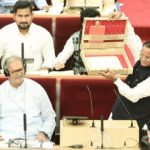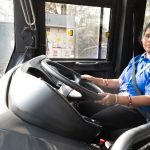New Delhi: Union education minister Ramesh Pokhriyal ‘Nishank’ chaired a meeting with school education secretaries of all States & UTs through video conferencing and discussed the various measures adopted for management of education system during Covid-19 and the different strategies adopted for online and offline learning in schools so far and the way forward.
Minister of state for education Sanjay Dhotre; secretary, higher education Amit Khare; secretary, school education and literacy Anita Karwal and senior officials of the ministry were present in the meeting.
Representatives from almost all the States and UTs attended the meeting including additional chief secretaries, principal secretaries and secretaries education department; and with other State officials such as the State project directors, director SCERT. This is the biggest meeting held on school education during the pandemic.
Addressing the meeting union minister said that the current situation of Covid-19 is unfortunate, but government is committed to turn the situation into opportunity by doing new experiments to ensure safety and academic welfare of students.
The minister emphasized the need to continue the coherent efforts made by the states and UTs in previous year and underscored the importance of reaching out to most vulnerable and marginalized children in this pandemic period. He further stated that the department has taken up several Initiatives in 2020-21 for facilitating continuing learning during the pandemic. These include: expansion of DIKSHA under PM eVIDYA; DTH TV channels under the bouquet of SWAYAM PRABHA TV channels; launch of online NISHTHA training for teachers at DIKSHA; Launch of Manodarpan to cater to the socio-emotional and psychological needs of the students, etc. Also, several initiatives have been taken to reach out to children without access to digital education. He also underlined the importance of involving various stakeholders for effective implementation of the National Education Policy 2020.
Pokhriyal noted all the problems and suggestions made by the States. The States also appreciated the efforts made by the ministry of education providing all possible help to States to ensure academic welfare of students. The Union Minister thanked all the States for their commendable work in the field education and assured them that the Ministry will extend its full support in this difficult time and together we will fight this problem.
Acknowledging that the Government has adopted new and innovative methods in Indian education system to address the challenges arising due to covid pandemic, MoS Shri Sanjay Dhotre stressed upon exploring ways to provide hybrid education comprising of both offline and online teaching methods. For this we would need new learning methodologies, quality learning content and evaluation assessment model, he added. He emphasised that scientific temperament of students will play a deciding role in post covid world therefore education system of our country should focus on developing critical thinking ability, logical reasoning ability and scientific temper among students. He called upon everyone to work together as a team in furthering the spirit of NEP 2020 and effectively implementing it to achieve the desired goals.
A comprehensive Covid Response document has been issued by the Department on 4th May, 2021 and it delineates detailed action plan with corresponding timelines for all Stakeholders involved on Access, Retention, Continuous Learning, Capacity Building and Stakeholder engagement.
The major areas identified for intervention are: Identifying and mainstreaming of Out of School Children and ensuring sustained Enrolment, Retention and Transition; Academic learning & cognitive development of students; Capacity building- with specific focus on blended and home-based learning including student assessments and data use; Nutritional, socio-emotional support; Digital education and monitoring, tracking and remediation.
Further, the following components of Samagra Shiksha have been built into special and focused interventions in view of the present pandemic situation:
- Learning enhancement/enriching programme to provide supplementary material to children
- Library grant for ensuring availability of reading material to students
- Special Training for Out of school children and Children With Special Needs.
- Support for out of school children of age group 16 to 19 years through NIOS/State open schools.
- SMC training to be utilized for ensuring community participation, parental support
- Teaching learning Material at ECCE and primary grade
- Setting-up a help desk at Panchayat level and creating awareness through use of mass media. It can also be used for conducting online learning and content dissemination over electronic media.
- Child tracking funds may be utilized for preparing student registry
- Special Grants to schools for sanitization and hygiene
- Teachers grants for awareness on safety and security in online mode and for enabling them to use online means of education.
- Grants for online content development and dissemination.
- Grants for teachers for accessing NISHTHA training over DIKSHA platform.
- Composite school grants to ensure continuity of learning and at least 10% of it to be used for Water, sanitation and hygiene in schools.
The department has started conducting the meetings of the Project Approval Board for approval of Annual Work Plan and Budgets of the states under Samagra Shiksha in the virtual mode, so that the states and UTs can get timely approvals for implementation of the above interventions.
Further, ad-hoc grants to the tune of Rs 5228 crore have already been released to the States under Samagra Shiksha and an amount of Rs 2500 crore will be released soon to ensure continuity of various educational initiatives by the States and UTs.
All states and UTs have shared their strategy for continuing the learning process during the pandemic. It was reported that most of the children have received the textbooks and apart from this, various supplementary graded material has also been prepared by the states. Haryana and Gujarat shared the details about the assessment being done by the state while schools are not opened. Many states such as Jharkhand, Ladakh, Madhya Pradesh and Rajasthan have made digital apps to promote learning. The pivotal role of parents and communities have been highlighted by all the states and UTs. States and UTs also shared the details to promote online learning through digital devises, Doordarshan and Radio.







